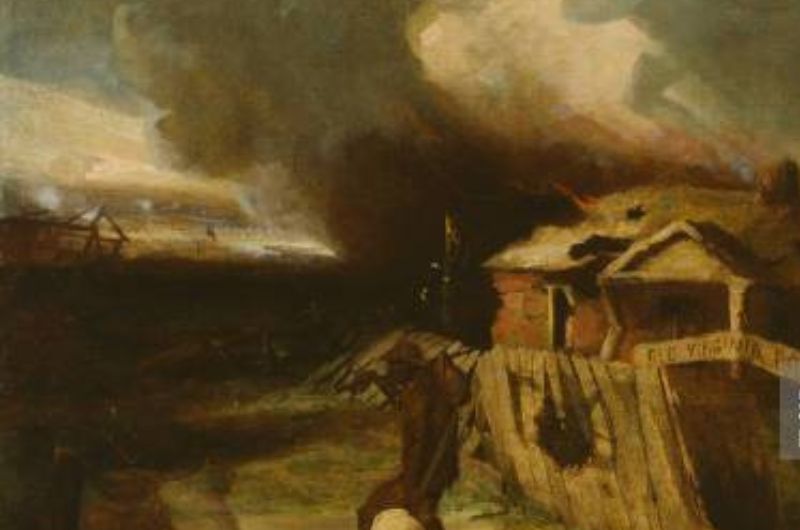
Last year, you cried to Ose River twice. The first time, to drop chicken eggs into the roaring waters for a miracle, and the second time, it was to drown yourself.
Before Pastor Paul hurried to you at the end of a church service with butterflies in his eyes and said, “Ogadimma, the chords of your guitar and your songs in E-flat constantly send me floating on the altar like a soap bubble,” and you, flattered and coy, mumbled, “Thank you, Pastor”, and stumbled to the gate. Before he phoned you and said, in a tremulous tone, “God, I can’t pretend anymore, I admire you, Mma, and I would love to have a date with you.” Before he told you on the first day at Tourist Garden, Asaba that he longed to see you strumming that guitar and singing Enya’s “Caribbean Blue” on his balcony at sundown, and you said, “Okay, Pastor. I will think about it.” Before some Nigerian soldiers gunned down your only brother Chidubem in Onitsha for waving the Biafran flag and Pastor Paul came and restrained your inconsolable mother from tearing off her clothes and rolling in the brown dust. Before he drove you to Onitsha Shoprite in his turquoise Camry and bought you gold-striped guitar and gowns that were red, so red, like the roses that grew in his garden and said, “This is just the beginning, Mma, just the beginning.” Before he cupped your cheeks in his lotion-softened hands beneath the whistling pine trees that encircled his village mansion, pulled you into his perfumed arms, and kissed you so hard that you went blind. Before he crouched on the white sand of Lekki beach, Lagos and asked, “Ogadimma, won’t you like to marry me?” Before that blustery Christmas evening, you lovebirds smiled back from the orphanage, singing carols, smiled across the orchard and into the gleaming swimming pool. Before you rose from that blue water, teary and shivery, and finally said, “Yes, I will marry you, Paul”, and he sank into the water to hide the tears in his eyes.
Before all these surreal events, you were an ordinary guitarist and salesgirl, but you’re not this minuscule, wingless dove that’s drenched in tears.
That Christmas Day you accepted his proposal, you whistled home and discovered your mother in the smoke-filled kitchen, spread-eagled on a blood-carpeted floor, near the stove, a knife stuck in her chest. The windows broken, dogs barking, and Papa was nowhere to be found.
Later, when the sun was turning red through trees, the police came, asked questions, which the dust-laden winds blew away, and then took the corpse into their van. Sympathizers came and sympathizers left, and when the moonlight started shining through the window, Amara your twin sister said, “It’s true Papa has fled from the village, but Pastor Paul’s my prime suspect.”
“Pastor Paul?” you asked, unable to veil your surprise.
“Have you forgotten how he thundered when Mama insisted that he won’t marry you?” Amaka asked.
“Paul’s innocent!” you said.
She sat up on her bamboo chair and lit a cigarette. After a few puffs, she said, “Your boyfriend can’t kill Mama on Christmas Day like a fowl and go free!”
You twins were in Chidubem’s pale yellow bedroom that housed geckos and stank of sewage. You sipped coconut juice from your teacup as if that would stop the chirping birds in the mango trees from scattering your thoughts. You ached to ask her what Pastor Paul would really gain from extinguishing a feeble light in the wind. You ached to ask her where exactly the villagers said Papa ran to. But you swallowed the words that crawled up your throat.
Amaka crossed her legs and, through her ringed nose, blew you a cloud of smoke. You only coughed because you were used to Amara. Amara was the only girl who smoked at Zee Supermarket where you twins worked as salesgirls. Amara was the only girl whom the customers hailed Ocean because she engulfed lascivious husbands. Amara was the only girl who wasn’t starving for a model’s shape. Amara was gap-toothed. Amara was tall. Amara had skin the colour of fresh cocoa. Your skin was littered with questions and you were not tall.
You were squishing overripe tomatoes with wooden spoons under the shadowy cherry tree in the backyard when a car came to a stop before you, and then Pastor Paul, your fiancé, appeared in a black suit, his flame-orange tie flapping in the breeze and his clean-shaven face advertising his dimples. The dimples disappeared when he settled on your bamboo chair.
“See, Mma, I have this feeling that it’s your sister who murdered your mother,” he said.
You rose with your bowel of mashed tomatoes and floundered indoors. When his car started, you stumbled to the window and watched the almond jeep trundle toward the dying sun. You wished Ngozi, your dearest friend, had not flown to America with her new husband so that you’d stroll to their house and watch her slap, bite and kick an imaginary suitor, as she often did so that you would laugh and laugh and laugh. You wished, also, that the sympathizers hadn’t dispersed. Even your sister had gone; she followed the men with torches into the bush in search of Papa.
At dawn, the men came back, rumpled and sweaty, without Papa. They claimed they had searched the palm trees, the boats, the farms, but they didn’t see Papa. When Mama was lowered into the earth, no eye saw Papa. When Pastor Paul was dancing to the altar with you as his wife, no eye saw Papa. When you were sniffling in Pastor Paul’s kitchen two years later because there was no child in your womb, no eye saw Papa.
“Stop sobbing like a toddler,” your husband told you one frosty night in the bedroom. “This marriage is barely two years: you’ll conceive, and your father will return. Don’t allow your faith in God to waver.”
You told him you needed him to be your anchor, you were sinking and sinking. But he planted a kiss on your forehead, took his Bible, and pulled the door open.
He usually left at dusk to preach, heal the sick and catch souls tumbling into hell. He had already caught your sister’s soul. Now Amara had cast all her cigarettes and bottles of whiskey into flames. Amara accompanied him to church every Sunday. Amara sang praises to God as if an orchestra of bluebirds was folded into her throat.
“Your husband made a blind man see last night!” Amara said with a wan smile of the pious, barging into your room. It was at sunrise. It was at your worst moment: a moment of imaginary flights, of sinking.
You watched as she perched on the desk. You watched as she told you how she loved you, how the choir loved you and missed your voice. Oh God, you thought and swatted off the mosquitoes buzzing around your legs. You wanted to ask her when she’d leave, but you heard yourself say, “Please don’t tell me anything about vigils.”
But she blundered to the bed, saying, “Can you believe Paul made a crippled man walk?”
You rose, padded to the balcony, squeezed your tear-filled eyes shut, and listened to the sounds of rain and ripe mangoes falling, the sounds of your husband’s Toyota coming. When the car shuddered to a stop, the only person he called was your sister, and she went running.
At night, he turned to you and asked, “Crying again? Because of our childlessness? Because Pastor Frank has started painting his new church, eh?” Your mouth hung open.
“I know Frank’s church towers above ours, but I’m not afraid of losing my members to him,” he said.
Pastor Frank was a beautiful man with a chiseled nose and a well-trimmed goatee, but he could not perform big miracles like your husband. Your husband was once his colleague in the church. Pastor Frank gravitated away and built his own ministry when his pockets were swollen with his congregants’ gifts. You wished he could perform miracles like your husband because he was the only one who festooned Mama’s grave with hibiscuses and prayed for Papa’s reappearance. Because he once wrapped his arms around you and said, “Stop crying, Sister. God knows the best. The very best, okay?” Because his gap-toothed smiles and fruity lips had begun to melt into every tea you drank. Because when you shut your eyes, you imagined the two of you on a beach, watching sailboats slit blue waters, drifting into his sleepy eyes as he stroked your hair, as he urged you to scoop your tears into music.
You flicked your eyes open, but your husband had disappeared downstairs. You listened: Singing voices – your husband’s and your sister’s, interspersed with the sound of leaves blowing in the wind – floated into the room. You opened the door a crack, saw their shadows holding hands, banged the door shut, and curled on the bed like a wet cat, dying.
At the first cockcrow, you told your husband you were going to your friend Ngozi’s house to pray for her ailing mother, but you escaped to Pastor Frank’s house.
The man of God, dressed in an immaculate white robe that made you think of archangels, was in his studio, hunched over the piano, striking the keys and screaming a song, his soprano voice quivering in the air like a sunflower. When he heard you snort, he spun around and hobbled to you.
“What’s the matter, Sister?” he asked.
But you couldn’t answer because there were tiny stones in your throat. He pulled you into those arms of his that smelt of pineapple and home, and you wished, fleetingly, that you could melt into him. After your explanations, after a brief prayer, he made a cup of tea for you. Then he was singing “Set Fire to the Rain” and you were strumming his guitar and crooning, your piercing vices threatening to shatter crystal glasses. But when the fluorescent lights went out and you wanted him so badly, he drove you back home, and then, he was reversing, smiling, waving. But you did not smile, did not wave. You stood there, at the gigantic black gate, staring at the fading yellow taillights of his Toyota, thanking God that you were able to restrain yourself from smothering him in a kiss. You knew that his lust-filled eyes, which glittered like black pearls under those studio lamps, had scattered the rising prayers like dust. And so, you trudged to Ose River, muttered prayers, and tossed the two chicken eggs, which you had picked on your way, into the tea-colored river for purification and conception. Then you rose and turned to the sunlight.
Back home, you heard someone moaning in your husband’s Prayer Room, peeped through the keyhole, and you were so terrified you staggered backward.
Before now, you had heard and read the improbable, seen and believed the improbable, but what you had just seen through the keyhole shocked you senseless. Your husband was bare in a crimson-draped bed, nibbling at your sister’s breast, plucking her hair like guitar strings, and she was moaning to the rhythm. You wanted to scream, to cry, to crash into the door, but you caught yourself. Screaming meant burning your marriage. It meant starvation. It meant death. You stumbled downstairs, your heart a pot holding shattered glasses, your eyes twin bowls filled with water.
Later, your husband said your sister was cooking and he was praying.
You said, Praise God. Your sister said, Praise God. And, Emeka, the new houseboy from the church, served breakfast – sliced bread and fried eggs. You ate in silence, gazing at the houseboy’s silhouette on the sun-reddened window, hoping desperately that he’d saunter to the table, take your hands into his, and say, Madam, what’s the matter, please? You look so sad. But the lad emerged with your guitar, settled on the Afghan rug that has the colour of burgundy, and started strumming off-key.
At nightfall, your husband drained the glass of lemon you poured him, took his Bible and told you that he and your sister were set to grace the last vigil. You lowered your head and mumbled, “Good.”
“You’ve to be closer to God, my jewel,” he said, and kissed you on the forehead.
A sea-blue moth flew to the chandelier and hid. Another moth, pink and yellow, settled on the painted photograph of your wedding nailed to the wall.
“Wetin be the problem?” your sister asked you in pidgin English. “Let’s go church na.”
“Okay,” you said.
“Don’t worry,” your husband said, combing glistening beads of water off his curly hair. “The church is in Onitsha, not here at Oba. Since you missed the first two days, don’t…well, you may come along.”
“May I iron your clothes, Mma?” Amara asked.
You gazed at her, wondering why she, a helpless girl, was offering to assist you.
Your husband split the silence: “We’ve to leave Ogadimma to recover from depression.”
You looked up at him, and he gave you a wink, but you couldn’t smile.
“The clothes are in the luggage, no?” Amara asked.
“We all know you’re a kind woman, Amara,” he said. “Stop struggling to prove the obvious…. Mma, your sister’s a nice lady. We’re lucky to have her in our house. I hope she will stay here a little longer?”
“Yes,” you said, closing your eyes.
“You have got a tender soul,” he told Amara. “I hope the evangelists in my church will see you.”
“Stop it, Pastor,” Amara said, giggling. “You make me shy.”
“Only Ogadimma knows the meaning of that word,” he said with an awkward chuckle. “And talking about shyness, I hope our Mma has agreed to find a new job?”
“Yes,” you mumbled and drifted into the bedroom, your head filled with burning things.
Every Monday, every Sunday, your sister followed him to the tennis court and you floated to the window and watched them play and laugh. Every Monday, every Sunday, you stood at the window, watching him croon to the church with your sister. Every Monday, every Sunday, you hunkered down and prayed that he would remember your three-year wedding anniversary.
But he didn’t. Up in bed that midnight, you tugged him from sleep and told him that the marriage was three-year-old. But he mumbled something indecipherable and switched off his eyes. You shook him awake, said there was no problem, and asked him to please hold you and make love to you. But he brushed off your hand and staggered to the door.
You wished he could look back and see you cry, but he slammed the door behind him and the windows rattled. And as the winds intensified and the night grew cold, you found yourself writing words on a sheet of paper:
Darling,
Why did you let the butterflies I saw in your eyes
fall into the Ocean?
Now you, now Mama, now Papa
—the memories burning in my chest like dry leaves
And my mouth is collecting dust
And my eyes are Niger and Benue rivers
but do not come near, for you might drown.
You read it twice, then crumpled the paper into a ball, buried it in your guitar case, and cried yourself to sleep.
Screaming peacocks woke you at sunrise. Without washing your face, without brushing your teeth, without saying your daily prayer, you matched into your sister’s bedroom and said, “Amara, Amara. . . please leave my man. You’re beautiful, you’re smart and you’re funny. But I’m not. Have mercy on me, leave Paul for me. Or do you want me to fall?”
She sprang up from her bed and shrieked, “I will strangle the demon that has been stuffing your head with horrible lies!”
You clutched her hands and told her that you saw them naked with your eyes; that you had no university degree and no beauty and so you couldn’t compete with her; that she shouldn’t tell your husband about your discovery; that she should leave because this affair was choking you, killing you. But she brushed off your hands, shouted that she’d be back for you, flung the door open, and the fog swallowed her.
You flopped on the bed like a dehydrated tree. Then you rose, poured yourself some red wine, and braced yourself for your husband’s return.
But when the door creaked open, a stone sat on your tongue, and the jewel-studded goblet in your hand dropped and broke on the floor, multicolored shards flew out in every direction.
He stumbled in, reeking of beer and cigarettes, and said to you, “Look, listen: yes, Amara advised me to deny the affair, but I cannot since it’s clear you’ve caught us naked. Kindly forgive me, and zip your mouth. I don’t want my foe and competitor, Pastor Frank, to jubilate. Your sister was the cause of this downfall; she accused me of killing your mother. She was the Delilah that axed my faith and I, like a tree, fell and fell and fell and then fell in love with her.”
Boiled water seeped into your chest, spilled, and you found yourself throwing things at the intoxicated poet. Found yourself yelling that he was stupid and lax. Found yourself tearing his clothes until his eyes flashed. And while his eyes flashed, he bit his lips. And biting his lips, he rocked like he swallowed a tiger, grabbed your guitar from the bedpost and hit you on the head. You landed on the foam with a savage cry and he descended on you, slapping and cursing until you grabbed the breadknife on a stool and plunged it into his neck.
Minutes later, in a floral dress, you were scurrying to Heaven’s Ministry, Pastor Frank’s trendy church. Minutes later, the two of you were flying to the hospital in Pastor Frank’s jeep, your immobile husband at the back. Minutes later, the morticians were pushing the body into the dimmest room. Minutes later, on your way to Papa’s house, Pastor Frank phoned you, his voice quavering and urgent, and told you to abscond from Oba because the violent youths were combing the village for you. You turned to the bush with the swiftness of a madwoman and started running to Ose River. You didn’t stop until you reached the riverbank.
Characters that take their own lives in movies always made you question the competence of the producer; but now, in your own movie, you didn’t hesitate to fling yourself across the waters. A wrinkled fisherman in a boat, an unsolicited actor, forced himself into the episode: He dived into the waters, and then you were in his boat. “Why did you do that?” he asked.
But you lowered your head to the shivering indigo sun buried in the flowing glasses that were the waters. He sighed, an exaggerated actor’s sigh, and paddled faster, the waters clapping as fishes jumped. Frogs croaking as he told you how his only son capsized on the Niger while fishing; how he shuddered in the rain while the swollen body was carried offshore; how his wife cried and cried and cried. You said nothing, did nothing, as the boat sailed homeward on the rumbling waters.
* * *
Now, in a newborn year, you shut your eyes tight and press your Bible to your thumping chest in the court and imagine the fisherman coming to you on the wings of sinuous, water-colored clouds. He touches your shoulder and says, Drink your tears like wine because God has lifted the lamp of truth in this courthouse through your brilliant lawyer. You’ll not be hanged. It’s manslaughter, not murder.
You open your eyes and the fisherman disappears like smoke. Silence hangs in the court like a knife. The tears, which you’ve been fighting back, now trickle down your cheeks and drop onto your feathery sweater. Your sister, who’s perspiring behind you, is in black. By your left, your husband’s parents and three sisters are seated, all in banana-green, their faces impenetrable. The faces of the audience are stern with gloom.
Pastor Frank, who should’ve been here for you, was burnt to ashes at the village square last week. Your sister, as the Vanguard newspaper says, was the one who struck the match. And she admitted that in an interview with a Naij.com correspondent:
“Yes, I struck the matchbox because I was furious. Mary Okonkwo, Pastor Frank’s dumped fiancée, motivated me to do that when she visited and saw that I was still crying because of my sister’s situation. She informed me that Pastor Frank buried seven men, including my father, in Pastor Paul’s church for more followers. He stabbed my mother to death because she caught him tying Daddy up with wires and forcing him into a bag in our kitchen that glum evening. Pastor Paul, who was Pastor Frank’s boss at that time, ordered the beast to do so. I had always suspected Paul… thank God my guys razed down his church and unearthed those skulls that exposed them.”
You look up at the Judge, a plump bulldog in glasses, and pray that when he opens his mouth, a seven-year imprisonment will not tumble out like thunder. Because you’re tired of this world. Because as they hang and dispose of criminals into the deep hole where flies buzz and cover you with urine-soaked mud, birds will sing joyful songs in trees until all the falling leaves cover your grave. Because you don’t want to be remembered.
About the Author

Ebelenna Tobenna Esomnofu is a Nigerian creative writing teacher, editor and lover of artworks. He teaches English on social media(English with Esomnofu) and discusses literary books and literary culture. He was longlisted for the 2020 Commonwealth Short Story Prize, longlisted for the 2019 SynCity Short Story Prize, and longlisted for the 2022 Commonwealth Short Story Prize. His previous publishing credits include short fiction in The Sears’ Craft(print), The Scarlet Leaf Review, The Kalahari Review, StoryZetu, African Writer, Fiction Niche, Praxis Magazine, The Daylight(print), DNB Stories, Tuck Magazine, Storried, Afapinen, Fiction Niche, and elsewhere. His debut novel, MADNESS, has been completed.




Average Rating